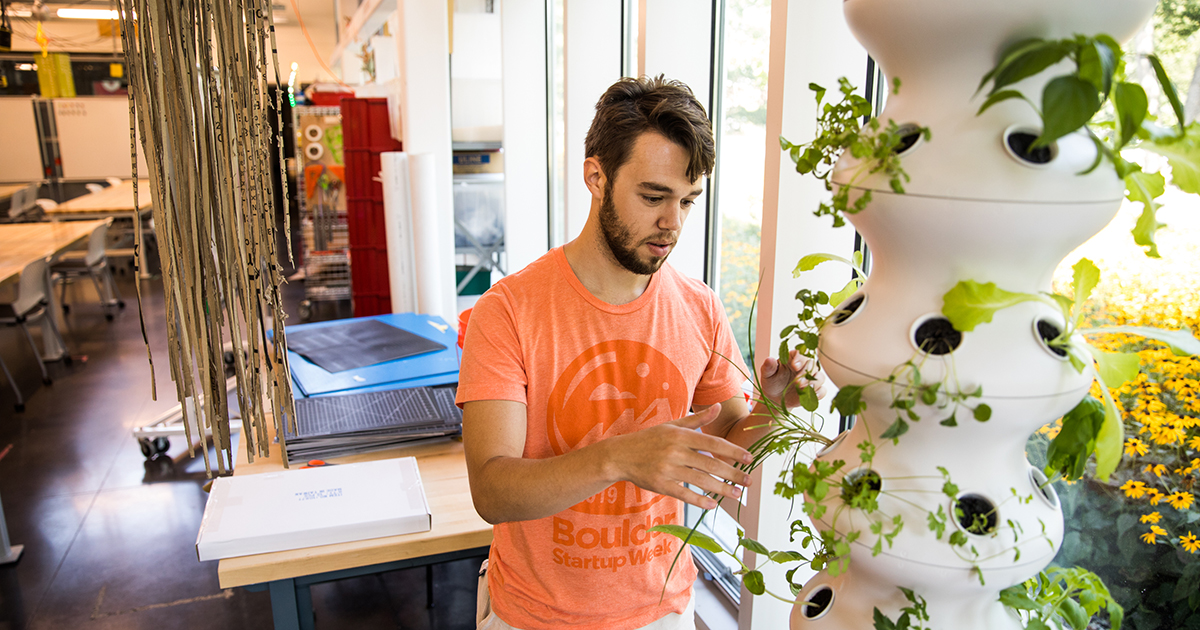Babson Resources Help Grow MBA Student’s Startup on Campus

After 13 months of physical labor and networking, Connor Harbison MBA’22 has cultivated fresh herbs and gardening structures at Babson College this fall.
“We’re really trying to make them very visible,” Harbison, founder of startup Atlas Urban Farms, said of these pop-up hydroponic towers installed at prominent locations campuswide, including the office of President Stephen Spinelli Jr. MBA’92, PhD.
“Using this hydroponic technology,” Harbison said, “I can set up a garden, and garden it with 24 plants in about 40 minutes. I just have to have a plug, and that’s it.”
Unlike traditional soil farming, hydroponic farming grows plants in water.
“A really good way to think of it is an aquarium that grows plants,” Harbison said of hydroponics. “The water is literally doing the work. It uses about 95 percent less water than traditional agriculture, and with these towers, you can have a much more dense system, so they’re really nice.”
New Business Venture
Harbison, a second-year graduate student, decided to pursue a hydroponic business venture upon coming to Babson last fall.
During his first year on campus, Harbison started wondering, “If vertical farming is a thing, why do food deserts still exist?” he said. “It sort of got me started on this journey.”
The U.S. Department of Agriculture defines food deserts as “areas where people have limited access to a variety of healthy and affordable food.”
In January 2021, “I started growing things in my apartment, mostly herbs, and I started an Instagram account,” said Harbison, a Boston resident from Philadelphia.
Harbison previously toured a “cool” vertical farming site in Jackson, Wyoming, he says, but had never grown any plants or herbs before establishing Atlas Urban Farms.
Calling it a “laughably naïve way” of addressing food deserts, Harbison started building hydroponic towers at home with food-grade plastic before learning about the “super helpful” resources of the Weissman Foundry at Babson, he said.
The foundry provided Harbison with the space, tools, and guidance to build his first hydroponic tower on campus, he said, and other Babson resources, especially its centers and institutes, helped him along the way.
Harbison made agreements to help generate revenue for his startup. He also was awarded an Inventureship™ from The Lewis Institute for Social Innovation, he said.
By building relationships with The Arthur M. Blank Center for Entrepreneurship, The Lewis Institute for Social Innovation, the Entrepreneurial Leadership Village, and the Weissman Foundry, Harbison gained key institutional support. These connections strengthened Harbison’s entrepreneurial spirit, allowing him to market Atlas Urban Farms as a successful startup that does business with Lettuce Grow, a company that supplies Harbison with hydroponic systems dubbed the Farmstand, which can be housed anywhere, he said.
“The whole Babson community has been very, very helpful throughout all of this,” Harbison added, saying he is “really grateful” to the Babson faculty, including Julian Lange, the Governor Craig R. Benson ’77, H’03 Professor of Entrepreneurship and Public Policy.
Social Events Company
Although Atlas Urban Farms grows herbs and produces hydroponic towers, the heart and soul of the company is bringing people together, Harbison said.
“I like creating a really memorable experience,” said Harbison, who previously worked as a tour guide in historic Philadelphia. Describing himself as “very extroverted,” Harbison said he likes teaching people and suggested the revenue driver for Atlas Urban Farms will be events and content.
In developing his startup, Harbison observed companies such as Brooklyn Grange LLC, an urban agriculture firm that hosts social events on rooftop soil farms in New York City.
“I’d rather be doing something and going in the wrong direction to figure it out later and sort of pivot. I think Babson not only professes that, but then gives you the tools to do that, and that’s just been the most key thing here.”
Connor Harbison MBA’22
“Imagine having a wedding on a farm on top of a building with Manhattan as the backdrop,” Harbison said. “That’s an amazing experience, but that shouldn’t just be for New Yorkers. That should be for Bostonians and people in Chicago and in L.A. and St. Louis. That should be in every city in the country.”
With Atlas Urban Farms, “The main business is creating these spaces,” Harbison said, “so that you can then have these experiences.”
Entrepreneurial Thought & Action
Harbison appreciates the Babson College mission to prepare and empower entrepreneurial leaders who “create, grow, and steward sustainable economic and social value everywhere.”
“Babson has this Entrepreneurial Thought & Action® (ET&A™) motto,” he said, “and I think that that action is so important. You can spend years coming up with the perfect business plan, and I think that’s sort of not really worth doing.”
A man of action, “I’d rather be doing something and going in the wrong direction to figure it out later and sort of pivot,” Harbison said. “I think Babson not only professes that, but then gives you the tools to do that, and that’s just been the most key thing here.”
Harbison’s startup has installed hydroponic towers throughout the Babson community, including the Weissman Foundry, the F.W. Olin Graduate School of Business at Babson, the office of President Spinelli, The Arthur M. Blank Center for Entrepreneurship, and the Carling-Sorenson Theater, he said.
The idea is to create pop-up hydroponic gardens on campus to help make Babson a “more sustainable and welcoming community,” according to Harbison’s college project proposal.
“My ultimate goal is to launch a sustainable business from this model,” Harbison said in his inventureship proposal for Atlas Urban Farms, “but testing it out at Babson College is crucial to my future success.”
With Atlas Urban Farms up and running, Harbison looks forward to building his team with the assistance of Babson resources.




